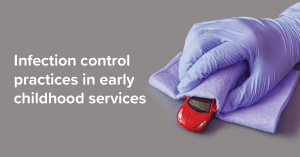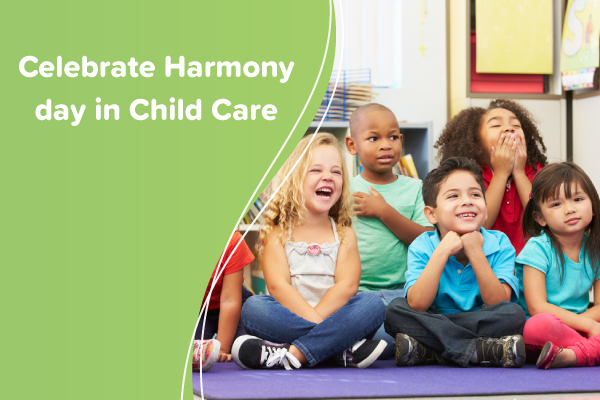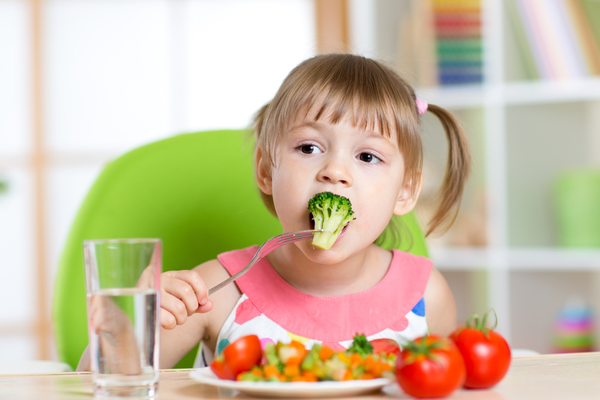For the early childhood education sector, infection control has always been embedded to a high standard within services. With centres in Melbourne now reopening, it is important to continue maintaining the new infection control protocols to help keep educators, families and our communities safe.

Risk mitigation measures undertaken by early childhood services aim to control infection with protocol focusing on prevention as well as reducing the spread of all types of infection, virus or illness. The measures include enhanced personal hygiene, monitored hand-washing practices, ensuring those who are unwell do not attend or visit services, reducing mixing between cohorts where possible and upholding immunisation policy.
Reducing infection risk will remain on the agenda for the foreseeable future. Specific COVID-19 infection control training is available online for educators focusing on the fundamentals of minimising the spread during the pandemic and beyond.
Infection control and prevention in child care services
The COVID-19 coronavirus pandemic has heightened the attention on avoiding the spread of illness in child care services, with minimising risk now more important than ever. COVID-19 is highly infectious virus and can easily spread through groups and communities when precautions are not taken. Other illnesses that are common in child care of which we can strive to reduce the spread include:
- Influenza
- Gastro
- Common cold
- Whooping cough
- Hand foot and mouth disease
Early childhood centres across Australia already undertake many infection control measures, with the National Quality Framework incorporating a range of standards for services to uphold which include a number of National Law and National Regulation requirements. The National Quality Standard Quality Area 2 centres around Children’s Health and Safety, ensuring that services use best practice in their approach to health, hygiene, illness, food safety and risk assessment.
A centre’s approach to preventing and managing infection should be documented for clarity and included in the Quality Improvement Plan. Increased attention to infection prevention practices along with additional policies around illness and hygiene can help early childhood services when it comes to the National Quality Standard, while continuing to provide a safe space for children to be cared for and learn.
In addition, services are being advised to create a COVID-safe plan which must set out:
- Your actions to help prevent the introduction of coronavirus (COVID-19) in your workplace
- The level of face-covering or personal protective equipment (PPE) required for your workforce
- How you will prepare for, and respond to, a suspected or confirmed case of coronavirus (COVID-19) in your workplace.
This plan must demonstrate how you will meet all of the requirements set out by the Victorian Government. Use this COVID Safe Plan template and guidance to create your plan
Preventing infection with practical strategies
These practical strategies will help your service and its community to avoid infection and illness, keeping everyone safe and well when early learning centres are back in operation.
Entrance sanitiser: Supply hand sanitiser for use upon entry to the centre to reduce the germs that come into your service.
Effective hand-washing: Hands need to be washed for twenty seconds and must involve applying soap and rubbing hands together thoroughly. Scrub the palms, tops of hands, between fingers and around the nails before rinsing. Using a hand-washing song with a twenty second duration has made this a fun activity for many children!
Taking temperatures upon arrival: A fever has been reported as a common symptom of COVID-19. As a result, to reduce risk of spreading infection it is strongly recommended that each child’s temperature should be screened using an infrared thermometer upon arrival at their centre or kindergarten. A temperature of 38 degrees Celcius or higher is considered a fever and the child should stay home until the symptom resolves.
If services do not have an infrared thermometer, and are having difficulties after making efforts to source their own supply, please email Early.Childhood.Implementation@edumail.vic.gov.au
See here for detailed guidance for administering children’s temperature screening. Posters have also been developed by the Department to display at your service, and to communicate to staff and families.
Stay home policy: Families and staff must be informed that they should stay home and not attend the service if they are showing any symptoms of illness. In the case of the coronavirus, this can include fever, tiredness, cough, loss of taste or smell, headaches and sore throat. For other illnesses it may be vomiting, rashes or runny nose. The Australian Health Protection Principal Committee (AHPPC) also advises that visitors and staff of a child care service should not be allowed to enter if they have been in contact with a confirmed case of COVID-19 within the last 14 days.
Maintain physical distancing: Keeping 1.5 metres of distance between each person where possible can minimise risk of infection spreading through your service. While this is unlikely to be achievable in groups of children, it should be the aim for adults in the centre during all interactions. Face coverings or masks are recommended for adults when physical distancing is not possible.
Face coverings: In early childhood education settings however, staff can choose whether or not they wish to wear a mask while working with children. When staff are working in other areas of the centre they are expected to wear masks, for example while working on reception, staff rooms or screening temperatures. Parents and carers are also expected to wear face coverings when picking up and dropping off children.
Face coverings should never be placed on children aged two and under, due to choking and strangulation risks. A person who has a medical condition – including problems with their breathing, a serious skin condition on their face, a disability or a mental health condition – is not required to wear a face covering.
Reduce interactions: Reduce contact or avoid unnecessary mixing of cohorts. This can be achieved with staggered arrival and departure times and increased space between activities. Consider more activities with smaller groups of children and utilising indoor and outdoor spaces where possible, while maintaining staff ratios.
Regular cleaning: Cleaning toys, surfaces and bedding is essential at least once per day to reduce the risk of transmission of infection. Ideally cleaning would take place multiple times each day. Deep cleaning may be needed in the case of outbreaks.
Food handling: Food safety and handling protocol should be upheld when preparing and serving meals and snacks. Children should not share food and each child should have their own drink bottle rather than using shared water fountains.
Coughing and sneezing: Coughing and sneezing can sneak up on people and don’t necessarily mean the person is unwell, however good hygiene is to encourage coughing and sneezing into the crook of the arm (elbow area) rather than into the hand.
The steps taken to mitigate risk of infection in early childhood settings are not only for children’s health and safety, but for that of adults too. In fact, adults including educators and parents are at highest risk of transmission of COVID-19. With this in mind, avoiding situations where adults are in close proximity is essential.
To further assist with communicating safety precautions to staff and families, the Department of of Education and Training have created the following posters that can be put up within centres:
- ‘Physical distancing’ poster
- ‘Stay at home if you are unwell’ poster
- ‘When to use a face covering’ poster
- ‘How to wear a face mask’ factsheet
- ‘Are you wearing your mask correctly?’ poster
- Service entry ‘face coving reminder’ poster
Handling an outbreak of infection at a centre
When handling an outbreak of infection within your child care service, your action should be swift and thorough. In the case of common child care illnesses, notifying families and undertaking a deep clean is usually sufficient.
If a staff member, child, family or visitor to your service has a confirmed case of COVID-19, there are a number of steps you need to follow:
- The Department of Health and Human Services (DHHS) will notify your service of a confirmed case. You will also be advised whether you need to close or continue to operate.
- You must inform families and staff. The Department will provide you with resources to help you with this communication.
- Services should then lodge a notification through the National Quality Agenda IT System (NQA ITS).
- A deep clean that is COVID-19 compliant needs to be arranged for your service. Your cleaning contractor should have knowledge on cleaning and disinfecting requirements pertaining to COVID-19.
- Stay in contact with families. Your service should continue to keep families informed throughout the process, while the Department will keep services informed of what is to come.
New WorkSafe advice
Please be aware of a new requirement to report confirmed cases of coronavirus (COVID-19) to WorkSafe. Employers must notify WorkSafe immediately after becoming aware that:
- an employee, independent contractor, employee of the independent contractor or self-employed person has received a confirmed diagnosis of coronavirus (COVID-19), and
- they have attended the workplace within the relevant infection period.
There is a requirement to report to WorkSafe using the online confirmed coronavirus (COVID-19) diagnosis form, or calling 13 23 60. Once you report a confirmed case, it’s likely that WorkSafe will make inquiries about your safety systems including your infection control measures, recording of injuries and near misses, consultation practices and risk assessment processes
More information about this process is available via the State Government’s Education and Training website.
Further resources for health and safety in child care
In addition to putting practical infection control strategies in place, your team should complete the COVID-19 infection control training online to ensure best practice is adhered to at your child care service. The training, developed by the Australian Government Department of Health, the covers the essential knowledge and skills required for effective infection prevention and control for COVID-19.
With face coverings and masks set to become the norm, ensure your team understands how to wear them safely. If your service needs extra support sourcing face masks in the short term, you can email: Early.Childhood.Implementation@edumail.vic.gov.au.
In addition to infection control support, this year has been particularly challenging. With this in mind, being aware that there are mental health resources available to you, your staff and your families helping to support wellbeing and mental health as we continue to navigate this pandemic.
We are all adjusting to new approaches and policies in early childhood and across many industries. By working together to follow procedures, communicating effectively and using common sense, we strive improve the health and wellbeing of our entire communities and hopefully enable restrictions to ease over the coming months.
For more information, please refer to the Coronavirus (COVID-19) advice for early childhood services provided by the Victorian State Government. Please note, any infection control and prevention strategies conducted should be line with the advice provided by the Australian Government Department of Health and the Department of Education, Skills and Employment.
Do you require additional support or information? The team at Practical Outcomes is here to help, so please feel free to get in touch.


